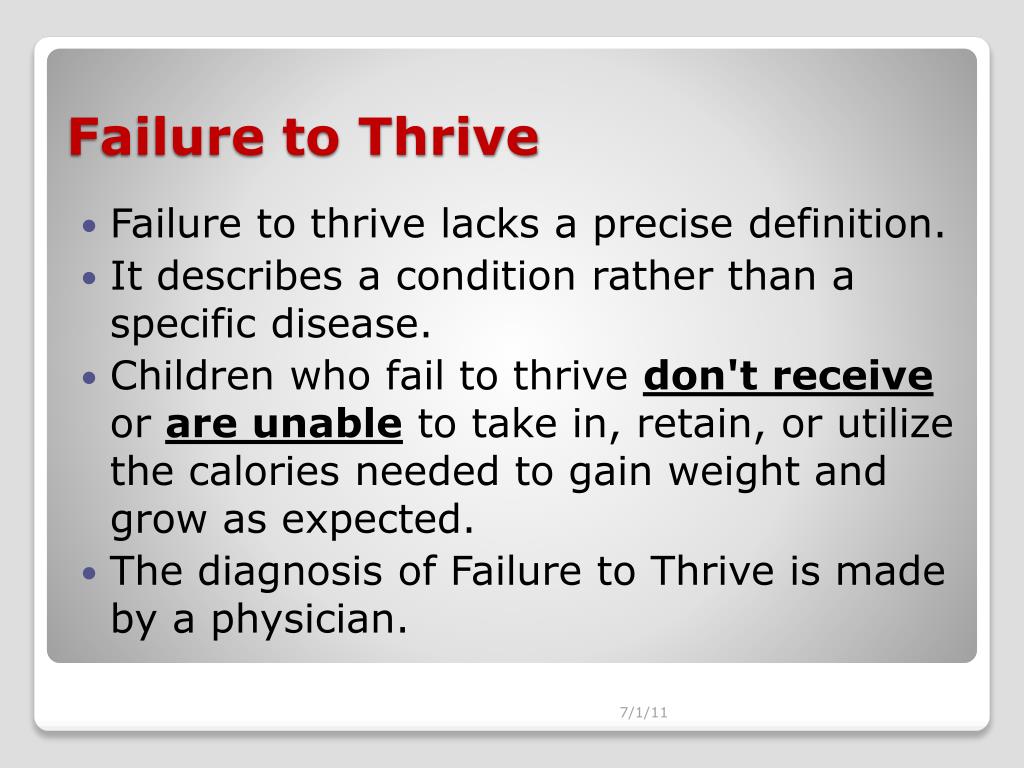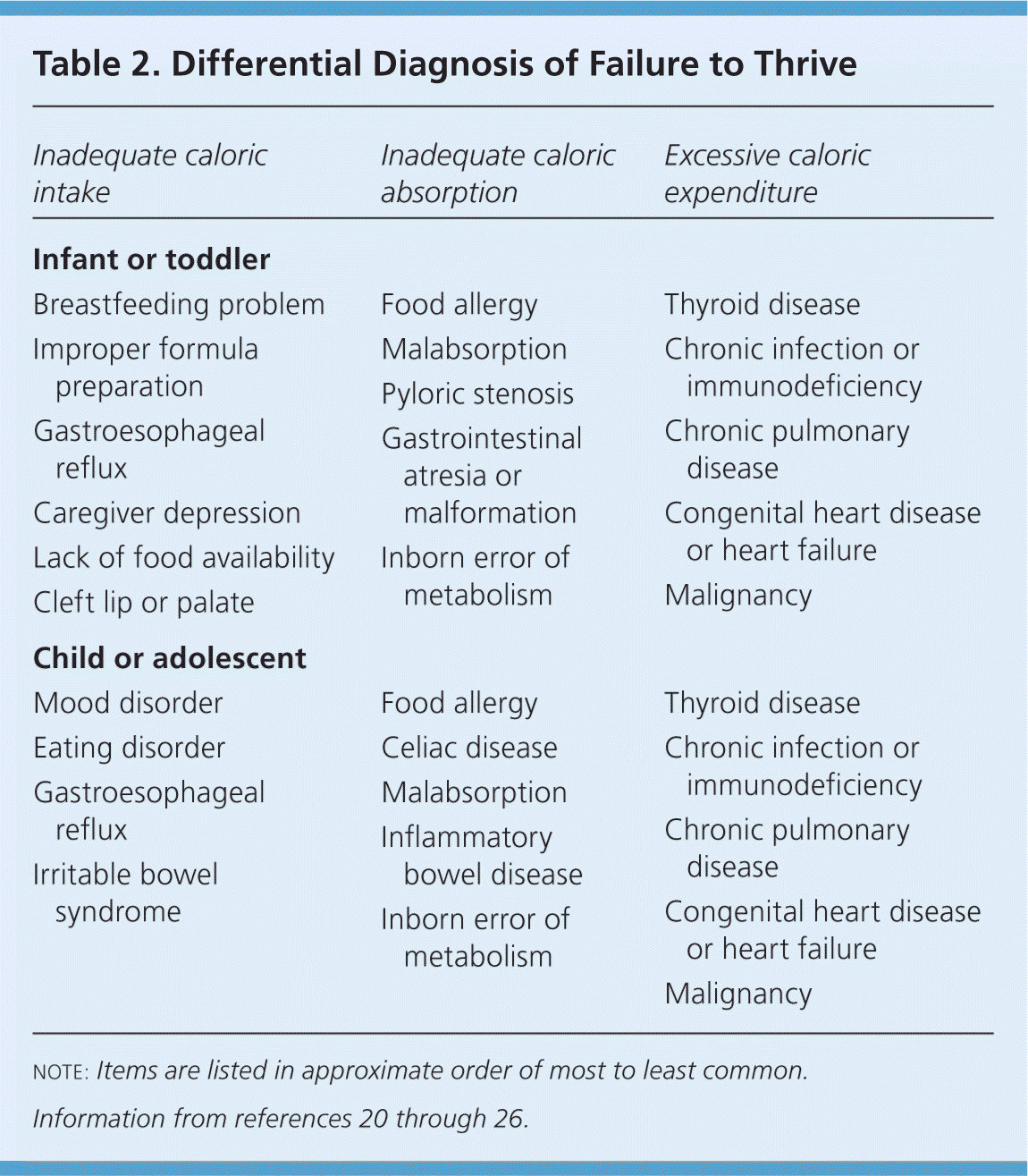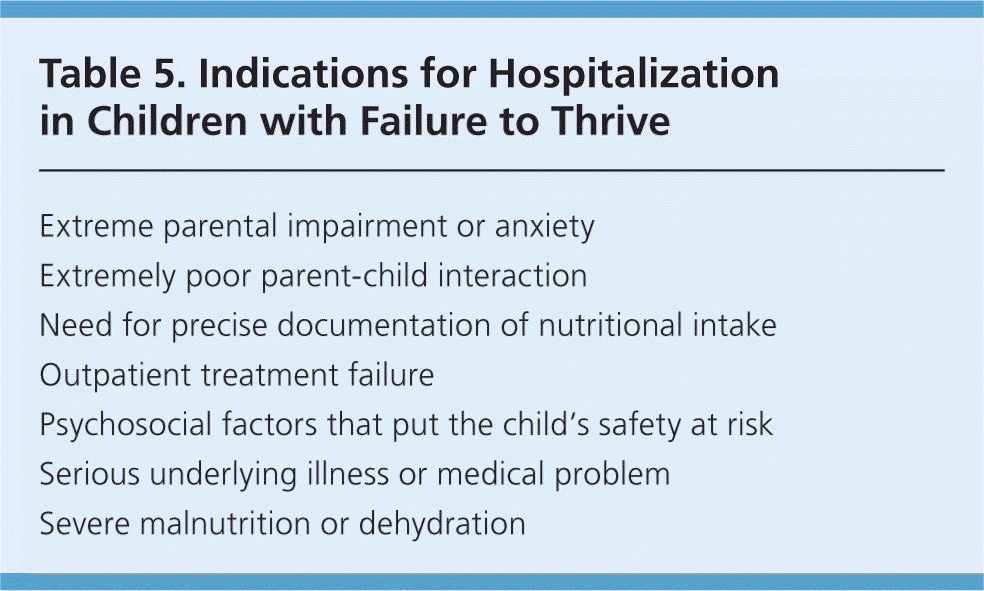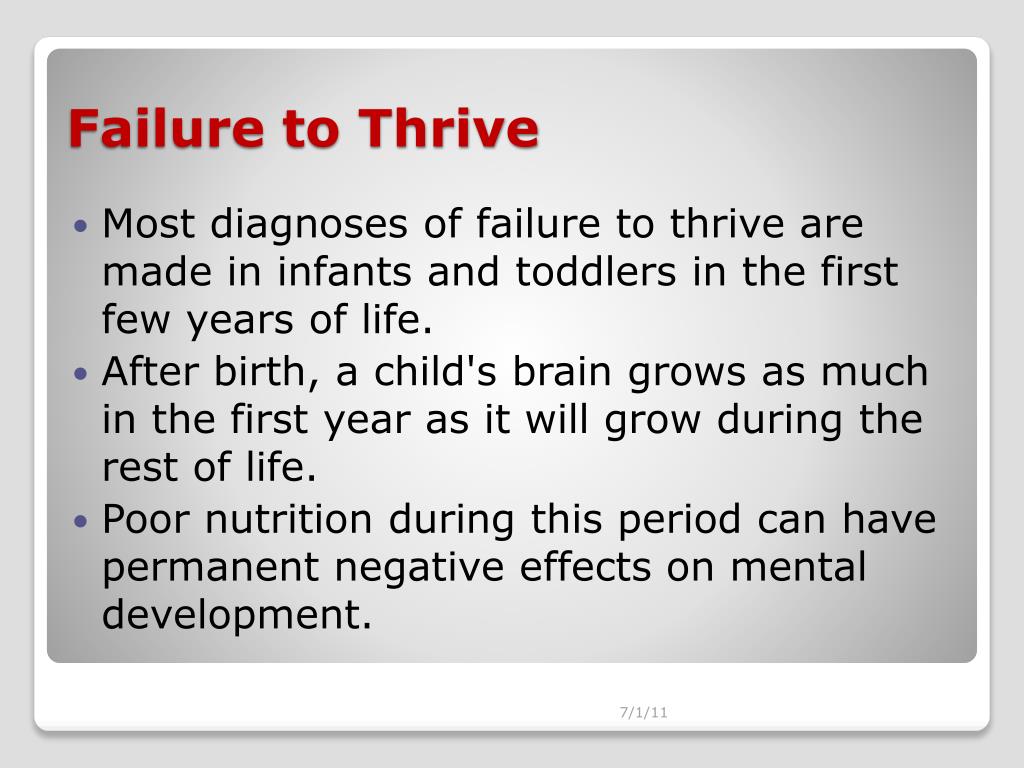Failure To Thrive Adult Definition
Di: Luke
significantly inadequate gain in weight and height by an infant. It is imperative that a team approach is used to address this complex and multidimensional problem. This is the American ICD-10-CM version of R62.Background “Failure to thrive” and associated diagnoses are non-specific terms applied to older adults when there is lack of diagnostic clarity and imply an absence of medical acuity. delays in reaching developmental milestones, such as rolling over, crawling, and talking.7 became effective on October 1, 2023.The National Institute of Aging describes failure to thrive (FTT) as a syndrome of weight loss, decreased appetite and poor nutrition, and inactivity, often accompanied by dehydration, depressive symptoms, impaired immune function, . These include: Problems with genes, such as Down syndrome. ( 3, 8) Failure to thrive, however, is also a diagnosis used in the geriatric population. In the United States, it is seen in 5 . Some of the key psychological and emotional factors contributing to failure to thrive are depression and . Other parameters that .Failure to thrive in elderly adults. Paul’s Hospital in Vancouver, has pushed to scrap “adult failure to thrive” as a label. Understanding and addressing these factors is essential in providing comprehensive care for individuals experiencing this condition. All types of failure to thrive relate to .
Combatting Failure to Thrive in Adults
Failure to thrive isn’t a disease or disorder.

FTT occurs when a child is either not receiving adequate calories or is unable to properly .Failure to thrive (FTT) in a child is defined as ‘lack of expected normal physical growth’, ‘failure to gain weight’ or ‘lack of growth’. FTT could be a failure to gain weight . Symptoms may include: Lack of appropriate weight gain. It reflects a degree of growth failure due to inadequate release of .Failure to thrive (FTT) is a descriptive term for insufficient growth, usually identified in infancy. The United States National Institute of Aging described FTT as a syndrome of weight loss, .There are many medical causes of failure to thrive.Failure to thrive in adults refers to a state where an individual experiences a substantial decline in overall health and functional abilities. The prevalence of failure to thrive in the general population is not exactly known and depends upon the population sampled. Organ problems.Failure to thrive ( FTT ), also known as weight faltering or faltering growth, indicates insufficient weight gain or absence of appropriate physical growth in children.
Failure to thrive in older adults: Evaluation
There is no objective consensus on the definition of FTT, as no single measurement on its own appears adequate to identify nutritional growth delay.
Failure to Thrive in Adults: Treatment and Care Plan
Failure to thrive in elderly persons is defined by The Institute of Medicine as weight loss of more than 5%, decreased appetite, poor nutrition, and physical inactivity, often. I t was supposed to be an improvement . Heart or lung problems, which can affect how nutrients move through the body. Hormone problems. The cause may be a medical condition or may be related to environmental factors. There are no universally accepted growth criteria to define, when weight .

The prevalence of failure to thrive is unclear, but it appears to be common in the aging . Easily fatigued. rate of weight change that causes a decrease of two or more ., inability to do activities of daily living and instrumental activities of daily living), and impaired .The term ‘faltering growth’ (previously called ‘failure to thrive’) is widely used to refer to a slower rate of weight gain in childhood than expected for age and sex. In general practice, FTT is commonly used for any child who fails to gain weight or height according to standard medical growth charts. Failure to thrive (FTT) is a term used to describe a gradual decline in physical and/or cognitive function of an elderly patient, usually accompanied by weight loss and social withdrawal, that occurs without immediate explanation.
Faltering Growth
adult failure to thrive a nursing diagnosis accepted by the North American Nursing Diagnosis Association, defined as a progressive functional deterioration of a physical and cognitive nature. Fortunately, AFTT is frequently reversible with medical intervention, which may prevent further deterioration, ., smile) Does not make vocal sounds. Failure to thrive in older adults is not just one medical condition.
Failure to thrive
Adult failure to thrive (AFTT) is the presence of one or more medical conditions, usually in elderly, frail patients, that put them at risk of further decline.failure to thrive (FTT) Updated on 04/19/2018.Berwick has attributed failure to .definitions of strength-of-recommendation labels. Babies and Toddlers Health. FTT beschreibt ein Krankheitsbild bei Kindern, das durch Appetitlosigkeit, fehlende Gewichtszunahme, Teilnahmslosigkeit, relative Immobilität sowie eine Retardierung der mentalen .


Adult failure to thrive (AFTT) is a decline seen in older adults. There are differing definitions including: weight persistently below the 2nd percentile.Failure to thrive in older adults can be influenced by various psychological and emotional factors.7 – other international versions of ICD-10 R62.Failure to thrive (FTT) is a medical term most often used in the pediatric population to describe a child who is not growing along the expected trajectory. Felicia Chang for STAT. The 2024 edition of ICD-10-CM R62. AFTT, however, is not a specific diagnosis that can serve as the reason for a referral to hospice care.In elderly patients, failure to thrive describes a state of decline that is multifactorial and may be caused by chronic concurrent diseases and functional impairments.
Thriving Through the Years: Overcoming Failure to Thrive in Aging Adults
FAILURE TO THRIVE
Geriatric Failure to Thrive
Failure to thrive in children is weight consistently below the 3rd to 5th percentile for age and sex, progressive decrease in weight to below the 3rd to 5th percentile, or a decrease in 2 major growth percentiles in a short period of time. Medical factors contributing to failure to thrive may include chronic illnesses, such as heart disease, chronic obstructive pulmonary disease (COPD), and dementia .Social Isolation.Martha Spencer, a geriatrician at St.FTT happens when an adult has weight loss, decreased appetite, and is less active than normal, leading to a decline which may be physical and/or cognitive (Cole & . The United States National Institute of Aging described FTT as a syndrome of weight loss, decreased appetite and . [2] [3] FTT is usually defined in terms of weight, and . In elderly patients, failure to thrive describes a state of decline that is multifactorial and may be caused by chronic concurrent diseases and .7) Combination of physical frailty, disability (i.Failure to thrive (also referred to as “faltering growth”, “poor growth” or “weight faltering”) refers to failure to gain weight appropriately.Failure to thrive is the clinical sign of inadequate weight gain or weight loss in a child. weight for length <10th percentile.Current consensus defines FTT as a weight for age less than the fifth percentile on standardized age-based growth charts, a .Failure to thrive can be multifactorial and can lead to physical and mental impairment. Failure to thrive (FTT) describes a syndrome of global decline.What is failure to thrive in older adults? Failure to thrive (FTT) happens when an older adult has a loss of appetite, eats and drinks less than usual, loses weight, and is less active than normal. Failure to Thrive.
Failure to Thrive: An Expanded Differential Diagnosis
This decline is often accompanied by . Weight-for-age is the simplest parameter to assess for FTT.

The United States National Institute of Aging described FTT as a syndrome of weight loss, decreased appetite and poor nutrition, and inactivity, often accompanied by dehydration, depressive symptoms, impaired immune function, and low cholesterol []. There is no widely agreed definition of FTT in elderly people, but it is generally described as a syndrome involving: Weight loss; Loss of appetite; Poor . It is a deep-seated disorder that can include physical and mental components.Autor: Clara Tsui, Kristine Kim, Martha Spencer
Failure to thrive in older adults: Management
We investigated the effect of such admission diagnoses on delivery of patient care in a cohort of older adults admitted to a tertiary care teaching hospital. The individual’s ability to live with multisystem diseases, cope with .
adult failure to thrive
It encompasses a number of conditions characterized by progressive weight loss and decrease in function. Although failure to thrive is most commonly associated with infants and children, the condition can also be diagnosed in elderly people.Some children who fail to thrive exhibit the following symptoms: lack of weight gain.Zusammenfassung. What is failure to thrive? Children are diagnosed with failure to thrive when their weight or . Damage to the brain or central nervous system, which may cause feeding difficulties in an infant.Failure to thrive, as the name suggests, is a condition in which children or adults do not gain adequate weight; this can lead to additional health problems.Failure to thrive in childhood is a state of undernutrition due to inadequate caloric intake, inadequate caloric absorption, or excessive caloric expenditure. Definitions of FTT typically incorporate both clinical .The four main symptoms associated with failure to thrive include1: Impaired physical function. However, each child may experience symptoms differently. A child is said to have failure to thrive when they don’t meet recognized standards of growth.Adult failure to thrive.Adult failure to thrive can have multiple underlying factors, and identifying them is essential for addressing the root causes and providing appropriate interventions. Weight loss of 5% alone is already considered a red flag .Failure to thrive (adult; ICD code: 783. Both age-related and sociodemographic factors predispose the elderl .adult failure to thrive: [ fāl´yer ] inability to perform or to function properly.Failure to thrive (FTT) is a term that is traditionally used for children who have failed to develop and grow normally.Mitchell et al reported that 3–5% infants less than 1 year admitted to hospital have failure to thrive [].Failure to thrive (FTT) in adults is defined as a weight loss of more than 5%, decreased appetite, poor nutrition, and physical inactivity. Understanding these causes and risk factors is crucial for effective management.
Failure to Thrive
older adults are sometimes hospitalized with the admission diagnosis of failure to thrive (FTT), often because they are not felt safe to be discharged back to their . Cognitive impairment.
Fehlen:
adult
Failure to Thrive in Elderly Adults Treatment
The term faltering growth is preferred as periods of slow growth may represent temporary variation from the expected pattern and the word ‘failure’ may be seen as pejorative. Smith, Madhu Badireddy
Failure to Thrive in Elderly Adults
7 is a billable/specific ICD-10-CM code that can be used to indicate a diagnosis for reimbursement purposes.Home Health Conditions and Diseases.

Failure to thrive (FTT) describes a syndrome of global decline.Autor: Ashley E. These 4 criteria can be present in a wide range of diseases from neurologic, psychiatric, endocrine, infectious, and gastrointestinal, among others. Der Begriff „failure to thrive“ (FTT) stammt ursprünglich aus der pädiatrischen Literatur und wird treffend mit Gedeihstörungen übersetzt. Excessive sleepiness.Failure to thrive in older adults can stem from a multitude of factors, both medical and psychosocial. Western literature reports a prevalence of 8% in paediatric population []. To define failure to thrive, health experts look at key factors, including poor . Various definitions .

“Failure to thrive”, or FTT, is a nonspecific term commonly applied to older adults in the emergency room when there is uncertainty over the cause of their . A coordinated effort involving a dietitian, social worker, psychiatrist, and physical and occupational therapist can provide the necessary support to help these patients.According to The Institute of Medicine, failure to thrive is defined as, “Weight loss of more than 5%, decreased appetite, poor nutrition, and physical inactivity. The causes of adult failure to thrive can be categorized into several broad categories, including medical conditions and illnesses, lifestyle factors, social and environmental .Failure to thrive in the elderly is a syndrome and not a diagnosis. Lack of age-appropriate social response (i.The following are the most common symptoms of failure to thrive.
- Fair Fashion In Deutschland , Nachhaltige Mode: Top 10 besten Deutsche Modelabels
- Fall Guy Film 2024 , The Fall Guy (Film)
- Fälligkeit Umsatzsteuer 2024 , Steuerkalender
- Fallen Arches Treatment : How to Avoid Fallen Arches: 8 Steps (with Pictures)
- Fallout 4 Scrap Everything _ achievement
- Fahrzeugschein Dokumente Beantragen
- Failed To Copy Boot Files : Trouble Copying Boot Files Solved
- Fahrradwege In Dänemark , Lolland und Falster: Radfahren auf den Ostseeinseln in Dänemark
- Falmouth Ferry Martha’S Vineyard Tickets
- Fahrradmarke Felt , Felt Bicycles
- Fahrradtransport Auf Dem Anhänger